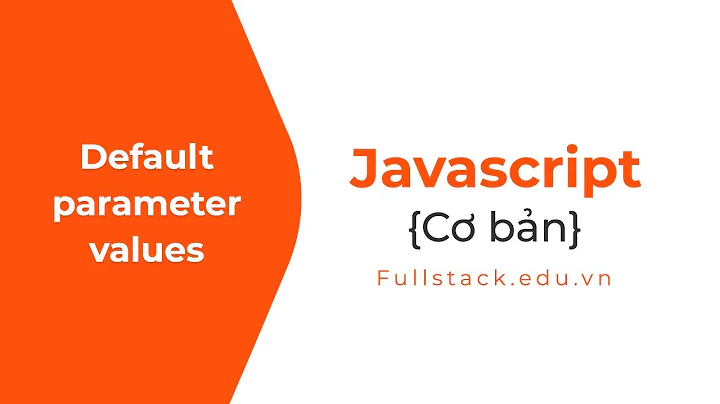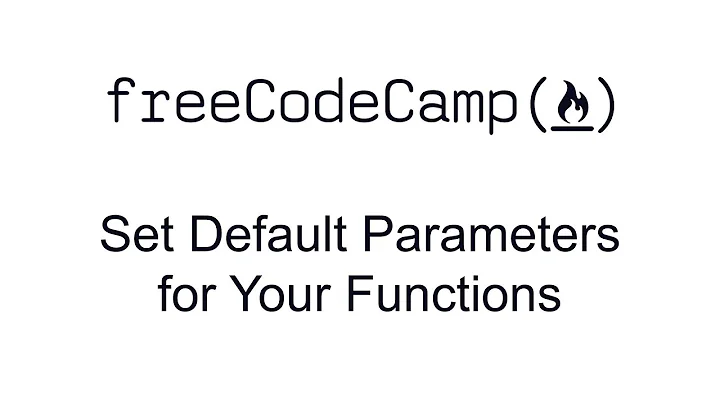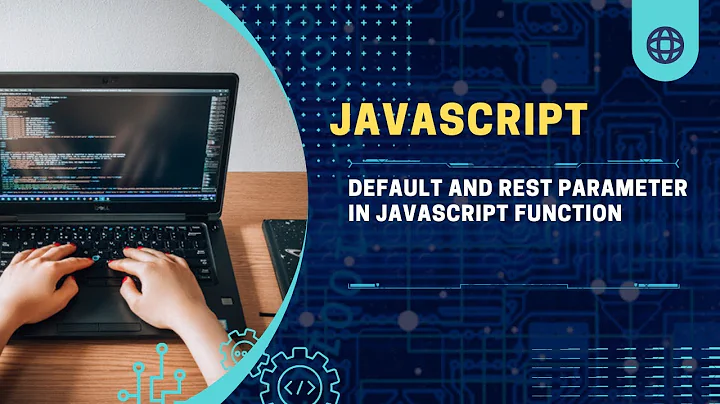Default argument values in JavaScript functions
Solution 1
In javascript you can call a function (even if it has parameters) without parameters.
So you can add default values like this:
function func(a, b){
if (typeof(a)==='undefined') a = 10;
if (typeof(b)==='undefined') b = 20;
//your code
}
and then you can call it like func(); to use default parameters.
Here's a test:
function func(a, b){
if (typeof(a)==='undefined') a = 10;
if (typeof(b)==='undefined') b = 20;
alert("A: "+a+"\nB: "+b);
}
//testing
func();
func(80);
func(100,200);
Solution 2
ES2015 onwards:
From ES6/ES2015, we have default parameters in the language specification. So we can just do something simple like,
function A(a, b = 4, c = 5) {
}
or combined with ES2015 destructuring,
function B({c} = {c: 2}, [d, e] = [3, 4]) {
}
For detailed explanation,
https://developer.mozilla.org/en/docs/Web/JavaScript/Reference/Functions/default_parameters
Default function parameters allow formal parameters to be initialized with default values if no value or undefined is passed.
Pre ES2015:
If you're going to handle values which are NOT Numbers, Strings, Boolean, NaN, or null you can simply use
(So, for Objects, Arrays and Functions that you plan never to send null, you can use)
param || DEFAULT_VALUE
for example,
function X(a) {
a = a || function() {};
}
Though this looks simple and kinda works, this is restrictive and can be an anti-pattern because || operates on all falsy values ("", null, NaN, false, 0) too - which makes this method impossible to assign a param the falsy value passed as the argument.
So, in order to handle only undefined values explicitly, the preferred approach would be,
function C(a, b) {
a = typeof a === 'undefined' ? DEFAULT_VALUE_A : a;
b = typeof b === 'undefined' ? DEFAULT_VALUE_B : b;
}
Solution 3
You have to check if the argument is undefined:
function func(a, b) {
if (a === undefined) a = "default value";
if (b === undefined) b = "default value";
}
Also note that this question has been answered before.
Solution 4
I have never seen it done that way in JavaScript. If you want a function with optional parameters that get assigned default values if the parameters are omitted, here's a way to do it:
function(a, b) {
if (typeof a == "undefined") {
a = 10;
}
if (typeof b == "undefined") {
a = 20;
}
alert("a: " + a + " b: " + b);
}
Solution 5
function func(a, b)
{
if (typeof a == 'undefined')
a = 10;
if (typeof b == 'undefined')
b = 20;
// do what you want ... for example
alert(a + ',' + b);
}
in shorthand
function func(a, b)
{
a = (typeof a == 'undefined')?10:a;
b = (typeof b == 'undefined')?20:b;
// do what you want ... for example
alert(a + ',' + b);
}
Related videos on Youtube
Douglas Crockford
Updated on July 24, 2020Comments
-
Douglas Crockford almost 4 years
Possible Duplicate:
How do I make a default value for a parameter to a javascript functionin PHP:
function func($a = 10, $b = 20){ // if func() is called with no arguments $a will be 10 and $ b will be 20 }How can you do this in JavaScript?
I get a error if I try to assign values in function arguments
missing ) after formal parameters
-
Miguel about 8 yearsSimple: where "1" is the default value. function abc (arg){ arg=arg===undefined?1:arg; }
-
-
Trey about 13 yearssort of...except if a===false then a=default value
-
Boopathi Rajaa about 13 yearsthe default value is only used when the argument is not set... not when it is set to false .... that is a wrong way of manipulation .... undefined, null, and false .. these three are different ...
-
csiu about 13 yearsThis isn't the best way to do it because if a parameter isn't passed then it's actually
undefined. It just happens thatundefined == nullreturns true. -
csiu about 13 yearsYou can also use
a === undefined. -
Trey about 13 yearsif the variable you are testing is false, then this statement will treat it like it's undefined or null.:
function testMe(a,b){ alert(a || 'fail'); } testMe(false); -
user113716 about 13 yearsThat's not correct. Any "falsey" value will cause the default to be set. The falsey values are
NaN,undefined,null,0,"",false. -
user113716 about 13 yearsI think your original answer was fine, given the explanation that
nullorundefinedwill trigger the default. Sometimes this is the desired behavior. -
Boopathi Rajaa about 13 yearsit is better to use
typeof a === 'undefined', because type coercion can take place..1==trueis true ....1===trueis false -
Boopathi Rajaa about 13 yearsthanks ... edited the answer.
-
Gabriele Petrioli about 13 years@jtbandes, it avoids the case where someone has done a
undefined = somevalue -
Tules over 11 yearsBoopathi this is frickin awesome, how did I not know this syntax?! Thanks so much man, this will tidy up my code a lot :D
-
jclancy almost 11 years@Aftershock the
==has some known issues, so it's best practices to use===unless==is necessary. See stackoverflow.com/questions/359494/… -
user2918201 almost 11 yearsStrangely, I feel like firefox was letting me define default parameters... or at least, it certainly didn't throw a syntax error. Chrome did: thanks chrome! And you you @Ravan
-
Jochen van Wylick over 10 yearsVery elegant - thanks!
-
 T Nguyen over 10 years@Ziggy: As of FF 15.0, FF does indeed support default parameters. It is currently the only browser to do so but this feature is proposed for ECMAScript 6 - developer.mozilla.org/en-US/docs/Web/JavaScript/Reference/…
T Nguyen over 10 years@Ziggy: As of FF 15.0, FF does indeed support default parameters. It is currently the only browser to do so but this feature is proposed for ECMAScript 6 - developer.mozilla.org/en-US/docs/Web/JavaScript/Reference/… -
Magnus over 10 yearsWhat about scoping? Without keyword var, will the created values have global scope?
-
Mark over 10 years@Magnus, no, because the presence of the variable in the parameter list means it's defined locally. Even if the caller omits the argument, it is defined locally as a variable of type
undefined. -
venimus over 10 years@GabyakaG.Petrioli Irrelevant. Who the hell would do that?
-
Gabriele Petrioli over 10 years@venimus you never know the context of your code..
-
pedromateo almost 9 yearsI think
a === undefinedandb === undefinedis enough. This solution is more efficient and elegant. You do not need to calltypeofand then to do a string comparison. Am I right? -
Robert over 8 yearsWarning! This is one of the most common bugs in JavaScript and should most of the time be avoided. As already mentioned, this will not work as you might expect for strings, ints or booleans.
-
 DKebler over 7 yearsworks until you have a missing options argument and need to check for a missing key like options.name. then if throws an error " Cannot read property 'name' of undefined. , cause well..options is ironically undefined. :).
DKebler over 7 yearsworks until you have a missing options argument and need to check for a missing key like options.name. then if throws an error " Cannot read property 'name' of undefined. , cause well..options is ironically undefined. :).










